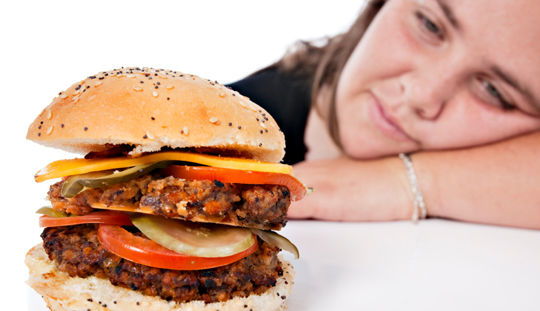
People who regularly eat foods like burgers, pizza, and commercial baked goods like muffins and doughnuts are 51 percent more likely to develop depression than their more health-conscious counterparts, according to a new study. Perhaps not surprisingly, individuals who eat these foods most often also tend to be less active and have poor health habits overall, such as smoking and working more than 45 hours per week. But even those who only occasionally indulged in less-than-healthy fare still showed an increased risk for poor mental health.
According to the World Health Organization (WHO), depression affects more than 121 million people worldwide and is the leading cause of disability. Individuals in low- and middle-income countries are particularly vulnerable and are least likely to have access to effective care and medications. However, even in high-income countries individuals do not always receive necessary care due to the lingering social stigma associated with depression.
Source: http://www.who.int
The new study, conducted by scientists from the University of Las Palmas de Gran Canaria and the University of Granada, was published in the March 2012 issue of Public Health Nutrition. Researchers examined data from nearly 9,000 participants of the SUN Project (University of Navarra Diet and Lifestyle Tracking Program). At the start of the assessment, none of the participants had been diagnosed with depression or had ever taken antidepressants. After six years, 493 participants (about 5.5 percent) were diagnosed with depression and/or began to take antidepressants.
Researchers concluded that the more of these foods an individual consumes, the greater his or her risk for developing depression, suggesting that a dose-response relationship exists between the amount of fast food and commercial baked goods consumed and the risk of depression. Still, according to lead author Dr. Almudena Sanchez-Villegas, “Even eating small quantities is linked to a significantly higher chance of developing depression.”
While the researchers emphasize the need for more studies to identify additional factors that may influence lifestyle choices and the development of depression, they do believe that controlling one’s intake of these types of food is essential due to their negative impact on obesity and cardiovascular health, as well as mental health.
JOIN THE CONVERSATION!
Do you think learning that there is a strong link between eating fast food and developing depression would be enough incentive for your clients to skip the drive-thru and improve their eating habits? Let us know what you think in the comments section below.